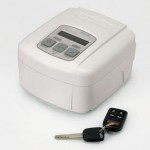 Finding out whether or not you suffer from sleep apnea may not be as difficult as you think. However, the process of getting a formal diagnosis may take a little time.
Finding out whether or not you suffer from sleep apnea may not be as difficult as you think. However, the process of getting a formal diagnosis may take a little time.
Sleep apnea is a serious sleep disorder that wreaks havoc on the body and brain. People who suffer from this exhausting health condition are prone to loud snoring, gasps during sleep, and constant respiratory problems as they doze.
When sleep apnea is present, stops and starts in breathing happen all night long, and the sufferer wakes up in the morning feeling even more tired than they did before they went to bed!
There are various tests that are used to isolate the presence of sleep apnea; all of these tests should be administered by a licensed, experienced general physician or specialist.
In general, when you seek out help, your physician will ask you about your nightly sleep habits; he or she may even question your significant other about your nocturnal behaviour.
Expect to be quizzed regarding your snoring, your energy levels in the mornings, and whether you wake up a lot during the night. Sometimes, people with sleep apnea are more subject to frequent night-time urination (or a series of annoying “false alarms”); this happens because the brain is deprived of oxygen and sends the wrong signals to the body.
Another diagnostic tool that is used by physicians is the Epworth Sleepiness Scale, and this is a list of questions that you’ll need to fill out as accurately as possible.
If the answers that you give your doctor seem to indicate the presence of obstructive sleep apnea, your physician may opt to send you for formal sleep testing.
During these sleep tests, or sleep studies, machines will note what is happening to your body during the night. Typically, polysomnography will be used to measure electrical activity in your brain, as well as eye movement and vital signs. Once these sleep studies are complete, your doctor will know for certain whether or not you suffer from sleep apnea.
In addition to the questions and tests listed above, doctors may also look at the health of your thyroid and your red blood cell levels. Sometimes, thyroid disease may co-exist with sleep apnea.
Testing your thyroid and blood count is one way to see if thyroid issues are at play. Your heart may also be checked to see if it’s healthy; sometimes, untreated sleep apnea stresses this major organ.
After testing is complete, you will know whether or not your have sleep apnea, and, if you do have this sleep disorder, you will be ready to seek out the right treatment for your health problem. Without the right treatment, you will continue to feel tired, stressed, and cognitively impaired during the daytime hours, and you may also experience heart or blood pressure health issues.
Find the Right Sleep Apnea Treatment
 Your doctor will recommend the usage of a CPAP machine, which regulates airflow while you sleep.
Your doctor will recommend the usage of a CPAP machine, which regulates airflow while you sleep.
CPAP machines are without a doubt the most effective treatments for obstructive sleep apnea, and these machines may be covered under your medical plan.
To get the benefit of such a machine, users wear soft, supple CPAP nasal pillows or CPAP nasal masks which are attached to CPAP machines via flexible tubing. All night long, sufferers receive the oxygen that they need to wake up feeling fresher, healthier, and more mentally alert.
To find out more about the right treatments for sleep apnea, contact a sleep apnea treatment specialist today.

1 thought on “Important Information about Sleep Apnea Testing”
Get as comfortable as possible. Honestly that it is not easy base on my experienced, but cpap can really helpful!